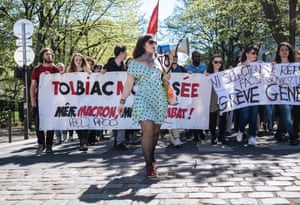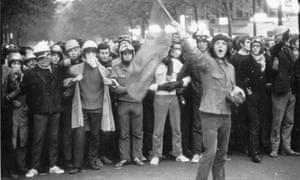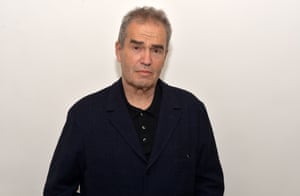When French riot police raided the Paris 3 University campus in Censier at dawn on Monday morning, evicting student protesters, the ghost loomed large of the student uprisings of May 1968.
Emmanuel Macron, the first French president born after that civil unrest, has faced several protests this spring. These have ranged from student sit-ins against the introduction of more selective entry requirements for university admissions, to train strikes over changes to state railways, and opposition to a new immigration law. Macron has said the demonstrators are in a minority and vowed to press on with his planned liberal overhaul of the economy.
But 50 years on from the student protests, the month of May is especially loaded with historic symbolism, which the government has brushed aside and trade unions would like to capitalise on.
One student protester, Antoine Guégan, knows better than most that comparisons are not clear cut between protests this year and the events of May 1968, which also saw a massive, nationwide general strike against a global backdrop of protests from Prague to the US.
Guégan, 27, was part of the Censier campus student takeover that was raided by police this week. His father, Gérard Guégan, staged sit-ins at the same campus, aged 27, in May 1968.

For three weeks, Guégan had sat up into the early hours debating how to fix society from behind the student barricades at Censier.
“It’s terrifying to see that this is becoming the norm for riot police to be sent into universities,” said Guégan, who is doing a doctorate on representations of slavery in American cinema and teaches at the campus while studying at another university in Paris’s suburbs. He will join labour day protests against Macron in the French capital on Tuesday.
“If there’s one thing in common between 1968 and today, it’s young people’s despair,” he said. “But it’s a different kind of despair, because the social and economic context is not the same. In 1968, there was a global movement, there was rock music, new sexual freedom, a different culture and a desire to change the old world. Today’s youth is facing a moment of stagnation, with little to lean on, which makes the struggle harder.”

One key difference, he said, was unemployment. In 1968, the French joblessness rate was less than 2%. Today, it is hovering near 9%, but youth unemployment, which is above 20% on average, can top 40% in many deprived areas. “It’s about feeling there aren’t prospects and, at the same time, seeing the government taking away social protections,” Guégan said.
Economic crisis and climate change also weigh heavily on this generation. “I remember when I was five or six, I had a schoolbag with the planet Earth on it and showing the hole in the ozone layer,” he said. “We’ve grown up with talk of environmental crisis, economic crisis, and now we’re looking for answers and solutions.”
A major concern is what Guégan called “police repression” in France. “Anyone today can be teargassed at a demo or hit by truncheons,” he said, adding that many were angered by police identity checks targeting non-white people and police evictions of migrants from tents in Calais.

It was the police evacuation of Sorbonne University on 3 May 1968 that brought Gérard Guégan, a leftwing writer, into the student uprising. From a working class communist family in Marseille, with a father who had been in the French resistance during the second world war, Gérard Guégan was living in banlieue outside Paris. He had recently been sacked from a job at a publisher after setting up a trade union, and was taking a book manuscript to a publisher in Paris’s Latin Quarter when he saw police dragging student leaders from Sorbonne and putting them into vans.
“What surprised me were not the arrests by police – we’d seen plenty of those during demonstrations over the Algerian war years before,” he said. “It was the fact that the passersby stood up against them. As the police vans drove off, stones were thrown at them. It was passersby and people in the street who were doing that.”
He stayed in Paris and joined the protests at a time when he felt strangers were suddenly striking up conversations in the street, rules were being broken and there were running battles between police and students wearing motorcycle helmets with bin lids as shields, some throwing not just stones, but petrol bombs.

Disillusioned with communism, Gérard Guégan’s group of ultra-left thinkers inside the occupied Censier campus used the name Nous sommes en marche [We are on the move] – almost 50 years before the centrist Macron called his new political movement En Marche.
Gérard Guégan will speak this week at an anniversary symposium held at the Nanterre campus where the May 1968 student revolt began. The site is currently barricaded by anti-Macron students. “What interests me is whether we’ll be heckled by today’s student protesters – I’m all for that, I’m all for dialogue,” he said, adding that it was right young people were “ticking off” the president.
One of Gérard Guégan’s favourite slogans from May 1968 was “Be realistic, ask for the impossible”. He said: “We were constantly thinking of what we called dreams, and what could be called utopia … Everyone was convinced that something massive was happening.”
His son, although “an eternal optimist”, said the current mood is more subdued. “There is something inaccessible about the notion of a dream. Today is about profound convictions, how it’s possible to live in a nightmare, but to think about how we can and should be doing things differently,” he said.